Recent Storm Damage Posts
Understanding Hurricane Storm Surges: Risks, Safety, and Precautions
1/9/2024 (Permalink)
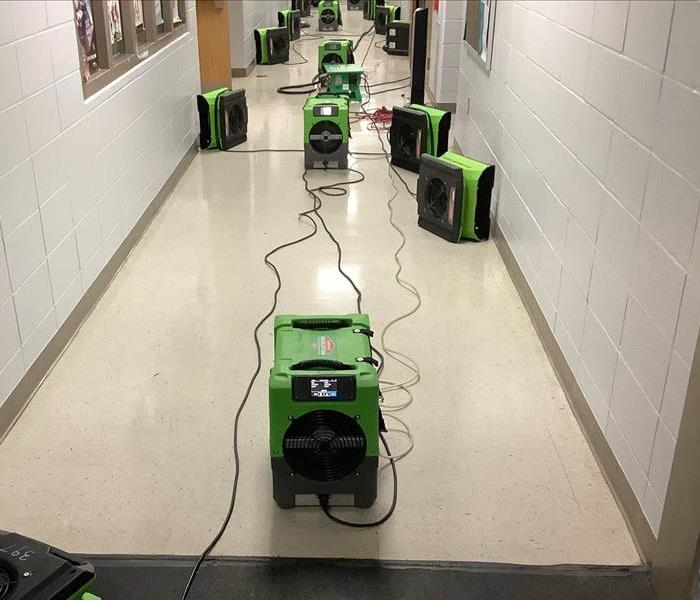 Stay informed, prepared, and vigilant, especially during hurricane seasons.
Stay informed, prepared, and vigilant, especially during hurricane seasons.
Hurricanes are natural phenomena that bring forth both the stunning power of nature and the potential for immense destruction. Among the various hazards associated with hurricanes, storm surge stands out as a particularly dangerous and often underestimated threat. In this blog, we'll delve into the complexities of hurricane storm surges, emphasizing the risks, safety measures, and necessary precautions to safeguard you and your property.
What Is a Storm Surge?
A hurricane storm surge refers to a rapid rise in seawater levels caused by a hurricane's strong winds and low atmospheric pressure. It's an abnormal increase in water pushed toward the shoreline, resulting in flooding in coastal and low-lying areas. Storm surges can amplify the destructive impact of hurricanes, causing extensive property damage, erosion, and endangering lives.
Understanding the Risks Associated with Storm Surge
Storm surges can flood coastal regions, often extending several miles inland, causing significant property damage and putting lives at risk. The sheer force of storm surges, combined with powerful waves and currents, can erode beaches, destroy structures, and uproot trees, leading to long-term environmental and infrastructure damage. Storm surges can result in life-threatening situations, with rapidly rising water levels trapping people in their homes or vehicles, making evacuation challenging.
Safety Measures and Precautions
Stay Informed: Keep abreast of weather updates, warnings, and evacuation orders issued by local authorities.
Evacuation Plans: Have a well-thought-out evacuation plan in place, especially if you live in a coastal area prone to storm surges.
Prepare Emergency Kits: Assemble emergency kits containing essentials like water, non-perishable food, medications, flashlights, and important documents.
Secure Property: If possible, secure or reinforce your property before the hurricane arrives by boarding up windows, securing loose objects, and safeguarding important items.
SERVPRO® and Post-Storm Assistance
In the aftermath of a hurricane, SERVPRO of Beaufort County, Hilton Head, Bluffton, Jasper is dedicated to assisting affected communities. Our expert team swiftly responds to storm-related damages, offering restoration services to mitigate the impact on your property. From water extraction to structural drying and debris removal, we work tirelessly to restore your property to its pre-storm condition.
Hurricane storm surges pose significant risks and can lead to devastating consequences. Understanding the dangers they present and taking proactive safety measures are essential to protecting lives and properties. Stay informed, prepared, and vigilant, especially during hurricane seasons.
Expert Tips to Keeping Your Property Dry in Storm-Prone South Carolina
9/26/2023 (Permalink)
Living in storm-prone South Carolina demands a proactive approach to flood prevention. The state's coastal location and varied climate can lead to heavy rainfall and hurricanes, making flood protection essential for homeowners and property owners. In this blog, we'll guide you through effective flood prevention strategies tailored to South Carolina, helping you safeguard your property and prepare for potential flooding.
Understanding South Carolina's Flood Risk
South Carolina's geographical diversity and coastal proximity expose it to a range of flood risks, from heavy rains to storm surges. As a property owner, it's crucial to be prepared for these challenges and implement measures to prevent flood damage.
Maintain Gutters and Downspouts
Clear, well-maintained gutters and downspouts are your first line of defense against flooding. Regularly remove debris to ensure proper water flow and direct rainwater away from your foundation. Installing gutter extensions can further help prevent water accumulation around your property.
Elevate Outdoor Equipment
Elevate outdoor HVAC units, generators, and other equipment above potential flood levels. This prevents water damage to these systems and reduces the risk of electrical hazards during flooding.
Install French Drains
French drains are effective at diverting excess water away from your property. Consult a professional to determine the appropriate placement and design for your property's specific needs.
Grade Your Landscape
Ensure your property's landscape is properly graded to direct water away from your foundation. Implementing proper grading can significantly reduce the risk of water pooling near your home.
Use Flood Barriers and Sandbags
In anticipation of heavy rainfall or storm warnings, deploy flood barriers and sandbags around vulnerable areas of your property, such as doors and windows. These temporary measures can help redirect water away from your home.
Elevate Living Spaces
If you're building or renovating, consider elevating living spaces above potential flood levels. Elevating structures reduces the risk of flood damage and minimizes the impact of rising water levels.
Invest in Flood Insurance
Given South Carolina's susceptibility to flooding, investing in flood insurance is a smart choice. Standard homeowner's insurance policies typically do not cover flood damage, so having flood insurance provides additional protection for your property.
Consult Experts
Engage with professionals who specialize in flood prevention, such as landscape architects, waterproofing contractors, and structural engineers. Their expertise can guide you in making informed decisions tailored to your property's characteristics.
Preventing flooding in storm-prone South Carolina requires proactive planning and a commitment to flood prevention strategies. From maintaining gutters and elevating outdoor equipment to installing French drains, grading your landscape, using flood barriers, elevating living spaces, investing in flood insurance, and seeking expert advice, these measures are essential for safeguarding your property. By taking these steps, you're not only protecting your investment but also ensuring the safety and well-being of your family or tenants during times of inclement weather.
3 Ways To Prepare Your Home for Winter Weather
12/9/2022 (Permalink)
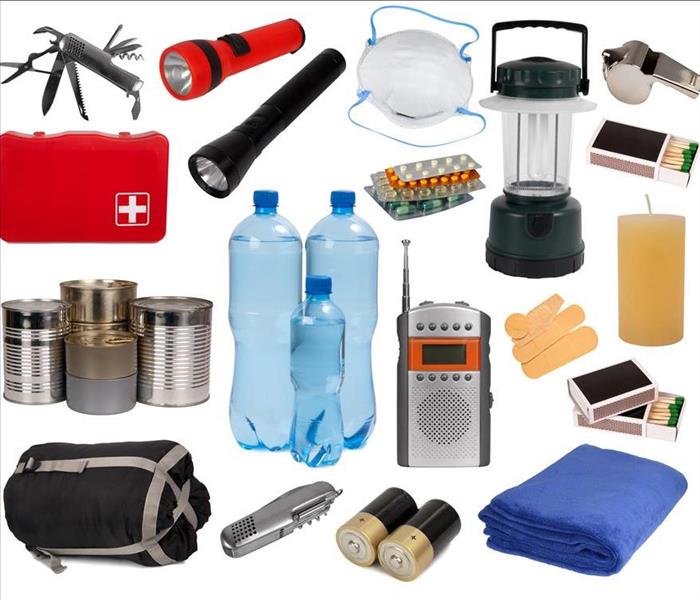 Stock up on emergency supplies
Stock up on emergency supplies
Preparing Your Home For Cold Weather
Winter is here, and it's never too early to prepare for the season. While you can't always control the weather, you can take steps to make sure that your home is safe during this time of year. Here are three steps you can take to make sure your home is prepared for the colder weather coming your way.
Winterize Your Home
Get a professional to inspect and make repairs to your furnace, water pipes and windows before winter. Seal cracks with caulk or foam insulation around doors and windows to prevent cold air from seeping in. Check the condition of your roof for leaks or damaged shingles that could cause problems if snow accumulates on them. Repair any issues before it snows heavily this season, so you'll be protected during the worst of winter's weather conditions.
Inspect Your Heating System
The first thing to do is to make sure your heating system is in good repair. Some of the things you should check include:
- The furnace, boiler and water heater all being clean and in working order.
- The thermostat is set properly for the current weather conditions by a professional HVAC technician. If it works well, you'll stay comfortable without wasting energy or money!
- Filters are clean and working properly on each air conditioner or furnace unit in the home (including window units). Cleaning them will help keep them from getting clogged with dust and dirt that could cause damage later on.
Stock up on Emergency Supplies
It’s best not to wait until the last minute when snow is fast and furious, so prep your home now. Make sure you have food, water and medicine. Store enough food to last at least three days. Keep non-perishable items in an open area of your kitchen or pantry (not your refrigerator) so they don’t lose their nutritional value if temps drop below 40 degrees F. Water is another must-have—you may need several gallons per person per day, which means more than one jugs Make sure you rotate expired items so nothing goes bad.
You will also need to make sure you have flashlights and batteries. It's always a good idea to keep plenty of flashlights around in case of a power outage (especially if you live in an area where storms can knock out electricity for days). Batteries are also essential for phones, radios and other electronics—and make sure you get fresh ones every chance you get! You might want to invest in rechargeable batteries as well; otherwise it'll be tough keeping them all charged up when the weather doesn't cooperate!
Finally, you want to make sure you have warm clothes and blankets. If recent history has taught us anything about winter storms, it's that they can bring unexpected drops in temperature while making roads slick with ice or snow - so make sure everyone has warm clothing before anything bad happens out there! Blankets are also critical since blankets help retain body heat during cold spells - especially true if it gets really cold outside overnight due to lack thereof heat inside buildings like ours here at home base. So get prepared early by stocking up now on those essentials before Mother Nature strikes again this year!
Being prepared for the first winter storm before it hits is imperative for protecting yourself, your family, and your home. Give SERVPRO of Beaufort County, Hilton Head, Bluffton, Jasper a call if you experience storm damage to your home, and we will get your Bluffton, SC home back to normal.
3 Mistakes Homeowners Make After Floods
10/1/2022 (Permalink)
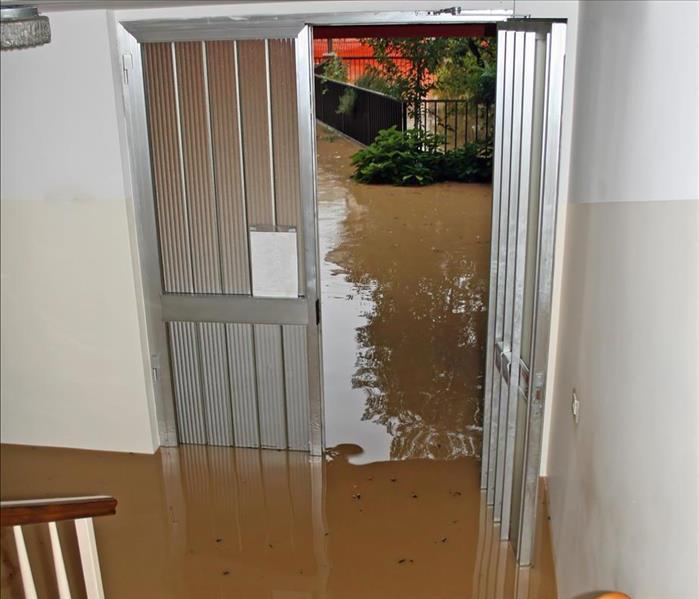 Floodwaters enter a home in Hilton Head, SC.
Floodwaters enter a home in Hilton Head, SC.
The Aftermath Of a Flood
After flood water has filled your home in Hilton Head, SC, you may not know what to do next. There are several common mistakes that homeowners make after their homes are impacted by a flood and knowing how to avoid them can help you get through the aftermath of a flood.
1. Staying in the Home
As waters rise, many people may be tempted to stay in their homes in order to protect what they can. However, staying in a flooded home during and after a flood has occurred can be hazardous for many reasons. If you have any indication that your home may be affected by a flood, leaving your home before the flood occurs is often wise. If a flood occurs with little warning, it’s generally best to leave your home and seek shelter in areas of higher elevation.
2. Wearing Inappropriate Clothes
Returning to your home immediately after a flood can be tempting, but it’s often important to make sure you have the appropriate clothing items and the necessary equipment before entering your home. Heavy boots, thick gloves, and a face mask are often useful to wear when entering a flooded home. Even with the right outfit and equipment, areas, where flood water is present, should generally be avoided since debris in the water could be dangerous and electrical hazards may not be clearly visible.
3. Attempting DIY Repairs
Water damage can impact the structure of your home and can damage many of your belongings. However, if you try to make repairs to your home or try to restore items that have been damaged, you may end up causing further damage. Instead, it can be helpful to call flood restoration professionals who can begin restoration while mitigating the damage that has already occurred.
Knowing how to react when flood water has damaged your home can protect you, your belongings, and your home. After a flood, it’s often best to get out of your home, wear the appropriate clothes and avoid making major repairs on your own.
No Flood Insurance? Here’s What To Do
9/14/2022 (Permalink)
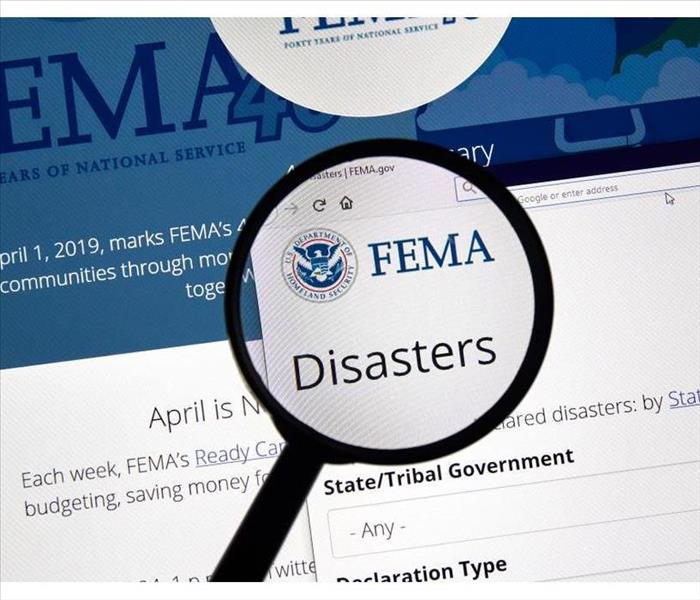 Visit the FEMA website and learn about your coverage options
Visit the FEMA website and learn about your coverage options
Applying for Federal Assistance
Did a devastating flood recently hit your home, and you are left feeling helpless because you do not have flood insurance? Help is available if you lived through a federal disaster. Keep reading for more information on applying for federal assistance.
FEMA Grants
If you live in a disaster-designated county, you may be eligible for this coverage. These grants can help you and your family afford the following expenses:
- Medical and dental care for issues that were caused by the flood
- Home repairs related to the flood
- Underinsured and uninsured loss of personal property
- Funeral expenses necessitated by the flood
- Temporary housing needs
There are other expenses that may be covered as well. If you live near a flood plain and recently experienced a disaster-related to it, it is time to visit www.fema.gov to learn more about the federal flood insurance application process. Be prepared for a federal inspector to visit your property.
Cleanup Assistance
If you need help with water damage in the meantime, a Hilton Head, SC, residential storm damage restoration specialist should be able to help. Most companies have technicians that are used to emergencies of this kind and can quickly set up a cleanup plan that will put your home on the path to recovery. If you are worried about being denied your federal insurance, know that you should still be covered for any damage as long as you take before and after pictures and save your receipts from repair work.
Help Is Available
A flood can be stressful for any homeowner. Not having flood insurance can make such a disaster even more worrisome. The best plan of action after a flood is to visit the FEMA website and learn about your coverage options - and seek professional cleanup assistance from a storm damage company. Help almost always exists after a regional tragedy. You just need to have a plan in place, so you know where to find it.
Reasons To Steer Clear of Flooded Streets
5/27/2022 (Permalink)
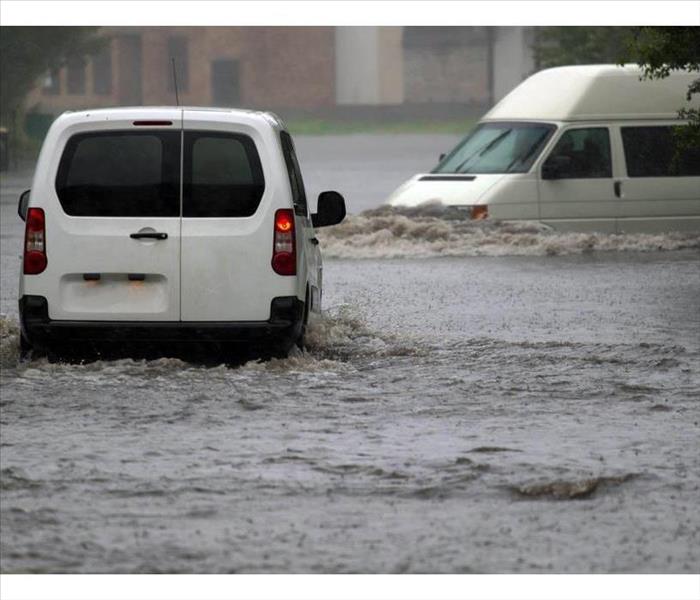 A flooded street may pose more problems to you and your vehicle than you expect.
A flooded street may pose more problems to you and your vehicle than you expect.
Flooded Streets: Why Should You Avoid Them?
Not many people expect rain to impede their daily commute. When there is a flash flood warning in Bluffton, SC, however, you need to be mindful of your usual route to wherever you are trying to go. Driving through a flooded street can have a lot of negative consequences.
Car Damage
Monitor the roads carefully as you plan your route on stormy days. Driving through standing water can cause a lot of damage to your vehicle:
- Rusted parts
- Contaminated fluids
- Electronic shortages
- Hydrolocking
Another problem that flood damage mitigation experts often see is mold damage from floodwaters to the interior of cars. To protect your vehicle, you need to avoid driving through puddles that are so big that you can't see the bottom of them. It's better to take a long way around than put your car in peril.
Obstructed View
It's always important to be able to see where you're going when you drive. The main hazard of a flooded street is that it obstructs your view of what's in front of you. Don't assume that the road is the same as it usually is. Under the water, there may be debris blocking the path, or the asphalt could be broken up, creating dangerous potholes or sinkholes. Find a way around the flooded area.
Travel Tips for General Safety
You don't know how deep the water goes on flooded roads. It's not unusual for cars to be swept away in rushing floodwaters, taking their panicked drivers with them. Even more concerning, you may not be able to escape your car quickly if this happens. To keep control of your vehicle, you need to stay on pavement that you can see. It's better to turn around and go home than take unnecessary risks.
A flooded street may pose more problems to you and your vehicle than you expect. Therefore, it's in your best interest to never drive through standing water on roads.
Preparing Your Commercial Building for an Upcoming Flood
4/30/2022 (Permalink)
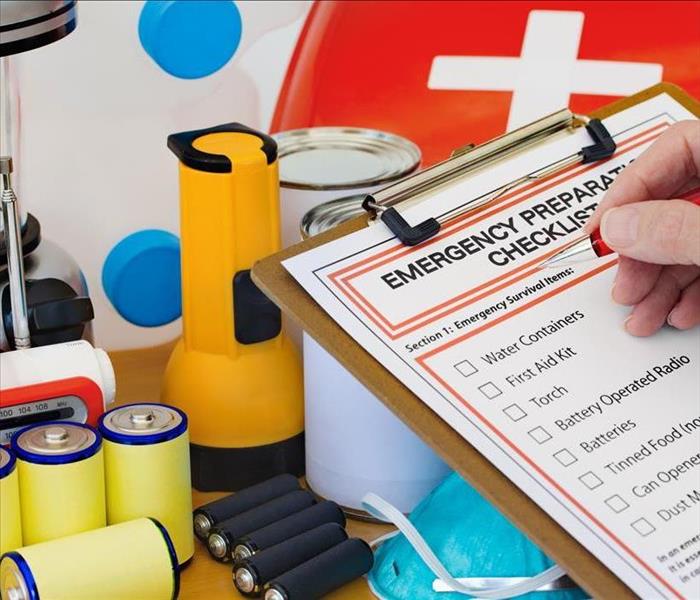 Make sure your property has plenty of food, water, and cleaning supplies.
Make sure your property has plenty of food, water, and cleaning supplies.
Getting Your Commercial Building Ready for a Flood
Since rain occurs in nearly every part of the country, it is perhaps no surprise that floods are the most common type of natural disaster in the United States. However, it is not just heavy rain that causes flooding. This emergency can also result from:
- Storm surges
- Coastal storms
- Dam overflows
- Snow
Flood damage to your Port Royal, SC, commercial building could be quite severe. That is why you should prepare for possible floods well ahead of time. Here are some tips for doing so.
Protect Your Assets
Floods typically affect the lower levels of a property. You should thus elevate valuable items in your building as much as possible. Any key documents should be stored in a waterproof container and placed in a high location. Consider creating backup digital copies of this paperwork, as well.
Get Insurance
You need insurance to help cover the cost of water damage restoration services after a flood. However, a commercial policy does not usually include flooding. Contact the National Flood Insurance Program to buy separate flood coverage.
Purchase Supplies
Make sure your property has plenty of food, water, and cleaning supplies. The latter is particularly important since floods often contain bacteria-heavy black water. The stores may be busy right before the storm when everyone in your area is stocking up on essentials. You should thus purchase what you need well in advance.
Keep Informed
The National Oceanic and Atmosphere Association have a weather radio that provides emergency alerts. Your local community likely has its own warning system, as well. Sign up for these systems so you know the exact nature and timing of the threat in your area.
Do not let severe flooding ruin your commercial property. Store important items away from the floor and purchase insurance that will help you repair or replace any damaged assets. Be sure to gather plenty of supplies and stay informed on the latest weather updates, as well. This should minimize any harm to the premises.




 24/7 Emergency Service
24/7 Emergency Service





